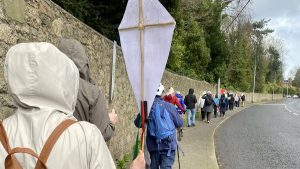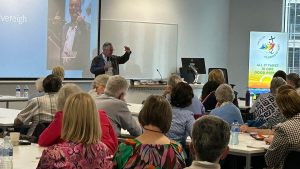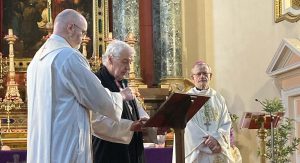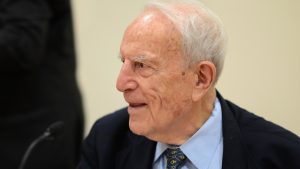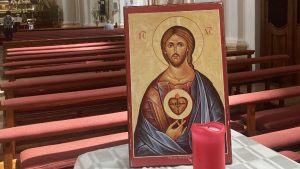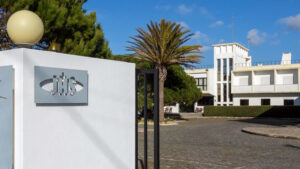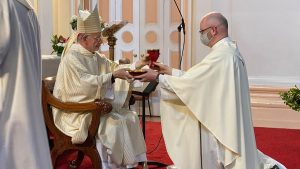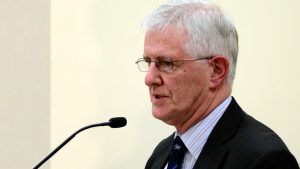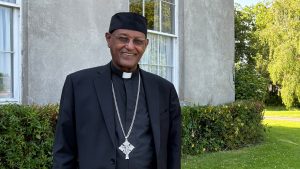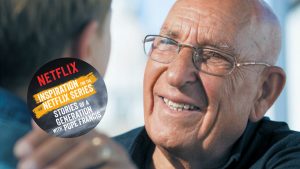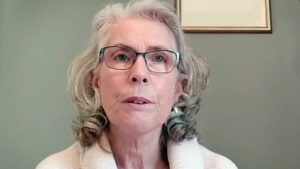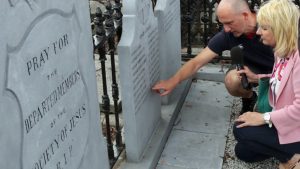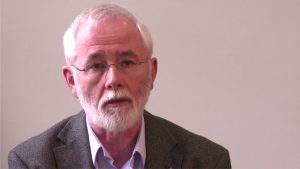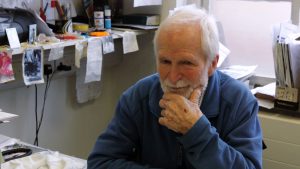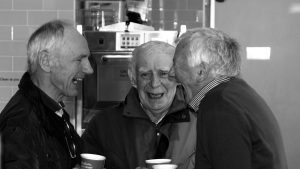Fond farewell to Soul Waves Radio

Soul Waves Radio, the ecumenical religious news syndication set up by the Jesuits and other religious congregations in 1990, sent out its last set of news stories and closed up shop at its final AGM on Friday 25 September 2020. (Read a short history below.) After the AGM on Zoom, Alan McGuckian SJ, now Bishop of Raphoe, led a gathering of people associated with the news syndicate service over the last 30 years in prayer and reminiscing. Church of Ireland members present included Janet Maxwell, Bishop Trevor Williams, (see photo) Kenneth Milne and Paul Laughlin. It was a meeting tinged with sadness and a sense of pride in a “job well done”. The considerable archive of audio interviews on religious and social affairs has been donated to Irish Jesuit Communications.
The final AGM of Soul Waves Radio began at 11 am. After the procedures and protocol were completed some of the board members said a few words. Brendan Staunton SJ, the Irish Jesuit Provincial’s representative on the Soul Waves Radio board, singled out the director and reporter Miriam Gormally (second from left in photo) for special mention. He commended not just the wide range of interviews she had conducted for Soul Waves down the years but also her interviewing style. He said that from first-hand experience he knew how Miriam put the interviewee at ease as she asked her probing and insightful questions. His comments were widely echoed at the follow-on meeting, with many attendees thanking Miriam for her years of service, her dedication, and her ability to multi-task, both technically and in administration and management.
Chair of the board, Mercy Sister Marie Stuart, expressed her gratitude and appreciation to accountant Seamus O’Brien for his hard work and support down the years. “For fifteen years you were always available to assist no matter what day or what time I got round to calling you, and I’m grateful to you for all that and more,” she said.
Marie Stuart herself was also thanked by board member Pat Coyle, of Irish Jesuit Communications. Pat noted the long years of hard work that Marie had put into, first, 3R productions, then RNN, and finally Soul Waves Radio. Her gratitude to Marie was echoed by Bishop Alan McGuckian SJ in the follow-up meeting. He said Marie gave years of faithful service and was a constant thread in the 3R story as one who was there at the beginning and the end of the audio production service He noted that she brought the same dedication and professional commitment to the closure of Soul Waves Radio that she brought to its inception as 3R three decades earlier.
Speaking herself at the second meeting, Marie recalled the excitement and enthusiasm they all felt in the early days of 3R. She noted how they were able to do interviews that perhaps local radio could not get people to do, for example, a family member bereaved by death by suicide. “We could get somebody who had direct experience to speak to us here in Dublin. That couldn’t happen on local radio. But the station could then use our interview as a springboard for a discussion on suicide and have a local expert in to follow up on our interview.”
She also noted how the staff landed some high profile interview down the years, recalling the work of Sr Kathleen, who interviewed the mother of missing schoolboy Philip Cairns, a big news story many years ago. “Kathleen would gather her now-so-outdated recorder, get on the bus and go and have tea and chat with people. Before she left she’d have an interview.”
Leading off the second meeting at 12pm, and after more personal introductions in break-out rooms, Bishop Alan spoke also about his memories of the early days of 3R. He recalled, in particular, the painstaking work that went into making a cassette tape: “We had to record the interview on tape on our heavy Morantz recorders. Then we had to physically edit the interview, marking the edit points with our yellow pencils and then splicing the tape with a special razor. We thought we were real cutting edge with those pencils and that tape! Copies then had to be made of the original, and then they were all enveloped and posted out to the various stations.”
He expressed his gratitude to Finbarr Tracey of Kairos Communications in Maynooth and Kenneth Milne, of the Church of Ireland studios in Braemor Park, for their assistance in that process. Both men were at the Zoom meeting.
Referencing the technology, Sr Helena O’Donoghue (VP of the Conference of Major Religious in Ireland, who instigated 3R) said the religious who wanted this 3R-type operation had to have a “conversion about machines”! “We were always of the view that you made do with what you had,” she said, “and we really didn’t understand the technology at all. But we trusted those who did”.
She said that the CMRS at the time wanted to support the possibility of reflective interviews on religious and social justice issues being made available to local radio stations. “And you all did it so well,” she said, adding, “Thank you for your faithfulness, and for being able to adapt technologically and in other ways down the years. I know this is closure but the whole venture has spawned new life,” she said, concluding that this new life will continue to contribute to the social and cultural fabric of Irish society long into the future.
Niamh O’Carroll also spoke, recalling the excitement and energy of the early days of 3R. “The world has changed a lot since then,” she said, “and so has the news. It was a simpler time, and we even had to check how to pronounce some of the names of world leaders we’d be referencing! Now with social media and 24/7 news the names seem more ordinary and available.”
Niamh made the point that some of the stories the 3R team did were groundbreaking and took a certain amount of bravery for a religious broadcasting outfit. “I remember we interviewed sympathetically an unmarried mother. Local radio stations told us it was great to get such an interview because it allowed them to raise the issue and bring in local professional public health people who could discuss it openly and in a helpful way over the airwaves.”
Martin Browne OSB attested to this as somebody who worked not only for 3R at the time but also for his local radio station, Clare FM. Martin has been a monk in Glenstal for many years, and he joined the meeting from there. “I remember posting out the CDs when we graduated to them from cassettes. And I was also sometimes there when the CDs arrived in the Clare radio station. The programme’s makers were glad to get them, and more than once their whole programme consisted of the interviews on the CD they were sent!”
Martin also reflected on how much has changed in the media world in the last 30 years. “We were sending out CDs on a two-week cycle. Now it’s all about Twitter and a two-second cycle.”
Tony Fitzsimons of Near FM endorsed Martin’s story of how important the syndicated interviews were for local radio. In a chat message, he said, “I really enjoyed all the brilliant interviews down the years,” and he went on to thank everyone not just for their support but for “the broad range of interviews” that did not fit easily into “the straight jacket of what some people perceived religious broadcasting to be”.
Church of Ireland board representative Paul Laughlin certainly was in no straight jacket, as evidenced by the stories he covered for RNN. “There was a media sensation when the Church of Ireland Archbishop of Dublin and Glendalough went on the record to say that sectarianism was alive and well there,” Paul recalled, adding that he did not shrink from the controversy but went out and interviewed the Rev Gordon Linney about the ‘raw nerve’ touched by Archbishop Jackson.
Fr Michael McCullagh (first left in photo), a former chair of the board of RNN in the time when Eileen Good was director, said he had many fond memories of his time working with all the staff. He recalled Eileen Good saying she wanted people to have a ‘feel-good’ factor about their faith. “We were a broad circle of friends,” he commented, “and usually in the broadcasting arena, there were no egos!”
Colm Holmes and Soline Vatinel of We are Church were often interviewed by Miriam Gormally down the years. Colm spoke warmly of Miriam’s engaging and sometimes left-field style that he said always got the best out of him, making him work hard at articulating what he actually believed. He said he was sorry that she would no longer be gracing the airwaves of local radio but was sure she had a stellar career in broadcasting ahead of her.
Soline noted that communication at core is a charism that is linked to the gospel and spreading the ‘good news’. She said she was grateful that over the years Soul Waves Radio lived out that charism as it communicated to people all over Ireland.
“A bittersweet experience” was how Miriam Gormally summed up the final day of Soul Waves Radio. She thanked all those gathered on Zoom for their support down the years and the kind words spoken about her at the meeting. She said she was particularly touched by the messages she got from the local radio stations – “People like Pat Quinn from Liffey Sound FM, who said he would miss us greatly”.
Others who spoke were clearly moved, even to tears, by the sharing of memories and stories. Elaine Comerford shared quite a few of her recollections, as did Breda Hegarty, who was part of 3R in the early days, and Josepha Smith who worked for RNN. Breda was at one with Elaine and Josepha in saying that “it was a privilege to be part of something so wonderful and doing so much good”. Breige O’Neill noted that the work produced was prophetic, “a sharing of the gospel in an inspirational and challenging way”.
Pat Coyle of Irish Jesuit Communications spoke at the end. She said that Leonard Moloney SJ, the Irish Jesuit Provincial, had asked her to express his deep gratitude to all involved in 3R, RNN, and Soul Waves Radio. He said the work they did was a work of evangelisation in the broadest and deepest sense of the word – sharing the challenging good news of the gospel through personal stories and reflective interviews through all the liturgical seasons.
He was also grateful that the Jesuits have been entrusted with the extensive Soul Waves Radio audio archive. Pat Coyle explained that her communications office will be incorporating that archive into the new build of the portal Jesuit website, jesuit.ie. She said the office team was also working with the Jesuit archives, exploring the optimal solutions for digital archiving of such a large body of audio material. She assured all those present that “these excellent interviews will have a good home”.
It was almost 1.30 pm when Bishop Alan was called on to give the final blessing, marking the end of 30 years service in religious broadcasting to the people of Ireland through the medium of local and community radio. It was a fitting end from someone who had blessed that service with his dynamism and faith from its earliest days. Job well done indeed.
A Brief History
The religious broadcast news syndicate 3R productions (Religious Resources for Radio)was formally inaugurated in 1991 at the instigation of the Conference of Religious in Ireland The service was established as a response to the rapidly expanding world of local radio and provided religious programmes around the country with up to three interviews weekly.
3R’s aim was to promote the Christian faith in the media by producing and providing audio and video material for programmes along with tuition in all aspects of producing programmes of a religious and social nature, including training, interviewing, and editing.
The company was under the trusteeship of the Divine Word Missionaries, Dominicans, Vincentians, Mercy Sisters, and the Jesuits. The Church of Ireland Broadcasting Committee was invited to get involved too, at thaat very early stage, since the service was conceived as an ecumenical one from the beginning.
The Jesuit Communication Centre was also established around that time and its director John Dardis SJ, also became director of 3R Productions. Alan McGuckian SJ, also from the Communications Centre, worked ‘hands on’ recording interviews and producing and distributing cassettes along with Niamh O’ Carroll and Martin Browne. Every fortnight a cassette tape carrying a number of short interviews was syndicated to local broadcasters.
Studio and editing facilities were provided at the Church of Ireland Theological College and office and administrative facilities were provided by the Jesuit Communication Centre. In spring 1993 Marie Stuart RSM became assistant director and in 1994 she replaced John Dardis SJ. Liam Cahill became director in the years 2004/2005.
3R Productions Ltd was incorporated as a company limited by guarantee in April 1997. In 1998 a new studio was opened at 36 Lower Leeson Street and in 1999 their cassette interview tapes were replaced with CDs.
Over the years the company strove to respond to the media communications challenges of a rapidly changing Ireland rocked by the clerical sexual abuse scandals in the ’90s and grappling to come to terms with increasing secularisation. The digital revolution was also in full swing by the end of the 90’s.
On April 27, 2006 3R registered a change of name to Religious News Network (RNN) by Special Resolution and filed an amended Memorandum and Articles of Association. The then director was Eileen Good, formerly of RTE religious programming. Vincentian Father Michael McCullogh became chair of the board and worked hard to ensure the funding stream that would allow RNN to continue in difficult financial circumstances. At one stage the Board that Michael chaired obtained financial support from the St. Stephen’s Green Trust. a lay philanthropic donor.
In 2009 when Eileen Good retired, RNN reporter Miriam Gormally became director and not long after RNN was renamed Soul Waves Radio and CDs were replaced with digitally syndicated interviews that were made available to radio stations across the land, through the online platform soulwaves.ie.
3r/RNN/Soul Waves Radio established itself as an independent voice in religious broadcasting. It provided a unique service that was regarded as professional and trusted by the local radio users. It dealt with a broad range of contemporary issues, with in-depth analysis, quality information and strong human interest.
Through syndication, it had a sizeable programming outreach hitting at times a peak of a quarter of a million listeners per item. Up to 30 local radio stations and 6 hospital radios used the resources provided them on specifically religious or local magazine programmes. Given the place of local radio within any given community, RNN/Soul Waves Radio was a significant resource and tool of ‘evangelisation’ in the broadest sense of the word.
Initially, the company was supported financially by the religious congregations and the Church of Ireland in Ireland. They also provided assistance by making available the trained personnel in the different religious communications offices who offered support on programming, technical and administrative issues. However, over the years, this type of support had diminished and more and more lay support was enlisted.
The original founders and supporters stayed involved though through annual financial donations. RNN worked essentially as a service and did not charge a commercial fee to users for the interviews provided, though some did make a contribution. But rising costs and dwindling congregations meant funding was always a challenge in later years.
In addition, in recent years the local radio market has expanded rapidly. Whilst initially, many local stations were happy to have religious programming on their schedule some new owners or franchises were not interested in religious programming and excluded it from their stations. By 2020 the board of Soul Waves Radio reluctantly came to the decision that the syndicated service was no longer viable. The final AGM took place on Friday 25th September 2020.


